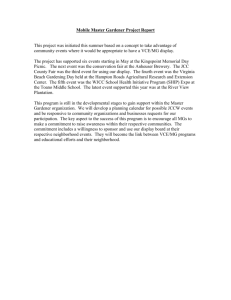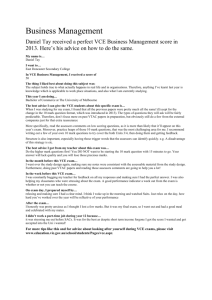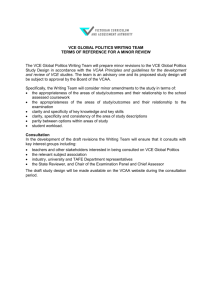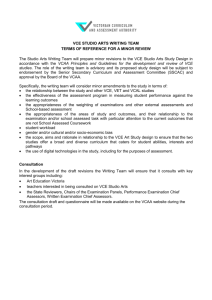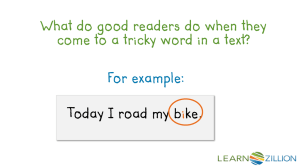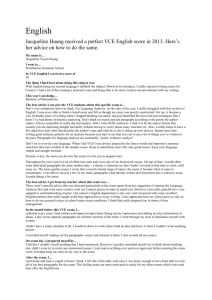VCE Overview Document (KNOW YOUR
advertisement
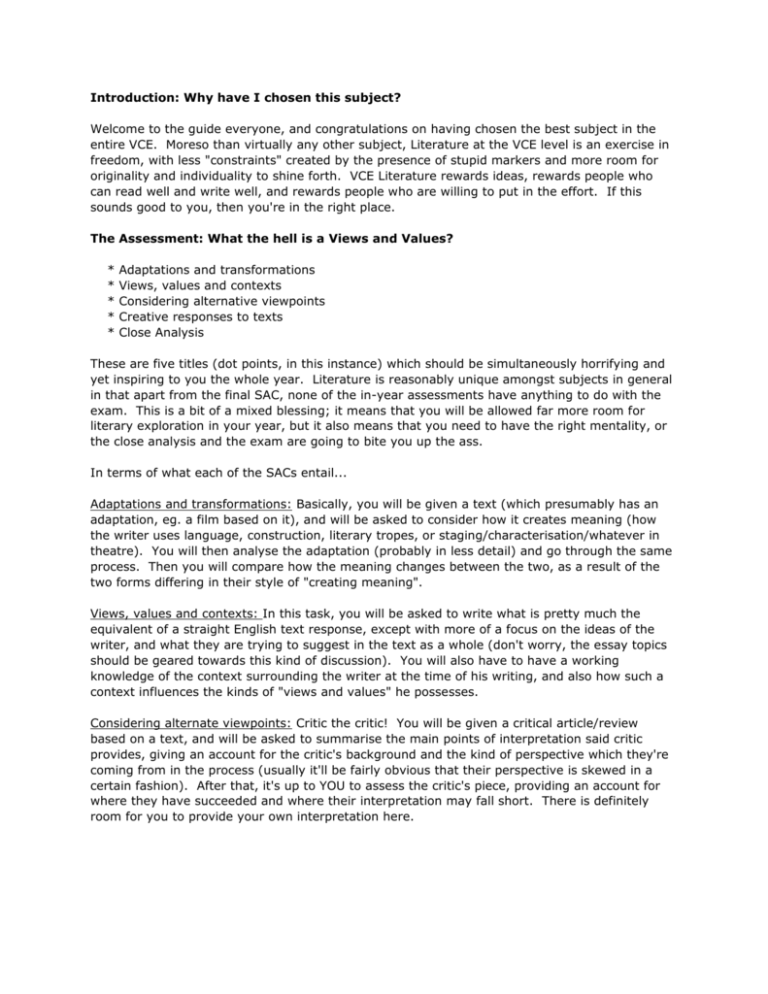
Introduction: Why have I chosen this subject? Welcome to the guide everyone, and congratulations on having chosen the best subject in the entire VCE. Moreso than virtually any other subject, Literature at the VCE level is an exercise in freedom, with less "constraints" created by the presence of stupid markers and more room for originality and individuality to shine forth. VCE Literature rewards ideas, rewards people who can read well and write well, and rewards people who are willing to put in the effort. If this sounds good to you, then you're in the right place. The Assessment: What the hell is a Views and Values? * * * * * Adaptations and transformations Views, values and contexts Considering alternative viewpoints Creative responses to texts Close Analysis These are five titles (dot points, in this instance) which should be simultaneously horrifying and yet inspiring to you the whole year. Literature is reasonably unique amongst subjects in general in that apart from the final SAC, none of the in-year assessments have anything to do with the exam. This is a bit of a mixed blessing; it means that you will be allowed far more room for literary exploration in your year, but it also means that you need to have the right mentality, or the close analysis and the exam are going to bite you up the ass. In terms of what each of the SACs entail... Adaptations and transformations: Basically, you will be given a text (which presumably has an adaptation, eg. a film based on it), and will be asked to consider how it creates meaning (how the writer uses language, construction, literary tropes, or staging/characterisation/whatever in theatre). You will then analyse the adaptation (probably in less detail) and go through the same process. Then you will compare how the meaning changes between the two, as a result of the two forms differing in their style of "creating meaning". Views, values and contexts: In this task, you will be asked to write what is pretty much the equivalent of a straight English text response, except with more of a focus on the ideas of the writer, and what they are trying to suggest in the text as a whole (don't worry, the essay topics should be geared towards this kind of discussion). You will also have to have a working knowledge of the context surrounding the writer at the time of his writing, and also how such a context influences the kinds of "views and values" he possesses. Considering alternate viewpoints: Critic the critic! You will be given a critical article/review based on a text, and will be asked to summarise the main points of interpretation said critic provides, giving an account for the critic's background and the kind of perspective which they're coming from in the process (usually it'll be fairly obvious that their perspective is skewed in a certain fashion). After that, it's up to YOU to assess the critic's piece, providing an account for where they have succeeded and where their interpretation may fall short. There is definitely room for you to provide your own interpretation here. Creative responses to text: Basically the same as any creative SAC, except with more of a focus on language. You'll be asked to write a short story based on the text of choice, and along with utilising the themes/setting/whatever your teacher asks for, you will need to utilise the STYLE of the writer. To make sure that you actually know what you're doing, you'll also be asked to write an account of how you utilised the style, giving specific examples in a written explanation. Close analysis: Covered in the next section. Some of you might be fretting by this stage - "this all seems so confusing! Why are the assessments so varied and random?". Have hope, however, because as you'll hopefully come to understand in the next section, the first four SACs actually contribute in some way to your understanding of the close analysis - it's just a matter of understanding how. The Close Analysis: Assessment Apotheosis Here we get to what you've all been waiting for - the Literature exam essay style, the close analysis (or passage analysis). I actually prefer to call it the argued reading, but both names reflect some aspect of what you have to do to succeed in this relatively unique task. Basically, the difference between the Literature essay and the English text response is that they are essentially inverted. In English, you are encouraged to have an overall contention, with your paragraphs being framed around smaller aspects of said contention, and with language and quotes from the text to support said smaller aspects. In Literature, language is always your first priority. Before making any comments about what the text "means", or even what the passages "mean", you have to suss out what's actually going on in the writing of the passage: what language devices and tropes are there, and what do they establish? As an example, observe: "The poetic allusion to “whose phrase of sorrow/Conjures the wandering stars” seems to embody a realm yet beyond the realm of Claudius’ kingdom, and with his declaration “This is I”, Hamlet appears to accept that his very being is constituted of both his actions and the intangible ethereality of the heavens." "Compounding “imagination” and “My gorge rises at it” alerts to the audience that Hamlet has finally embraced both the marvels of thought and the necessary boundaries of the physical realm; here, Shakespeare is depicting a completed man, whose comprehension of his universe is fully developed. " "Hyphenated and incoherent syntactical construction in “every body’s favourite – always wholesome” is, of course, a symbol of Mrs. Elton’s fragmented mind; beyond this, however, Austen is crafting in Mrs. Elton’s speech a vision of the general chatter throughout England, a landscape constituted not only by the gentility, but also by the entirety of human society." In all three cases, I have begun with a language device of some sort, analysing its usage and then drawing towards a deeper understanding of what is actually happening within the passage. This is what you want to do for most of your essay. Gradually, as your analysis becomes more and more complex (and complete), you want to start to build towards an interpretation: coupled together, what do all these language devices mean in the broader scheme of the text? You want to have an awareness of the views and values of the writer, and essentially, you have to provide for an account of what they are trying to suggest in crafting their text. Again, observe: "Rather than channel energies into the purely physical then, Passage Three is suggesting an amalgamation between mind and matter as being the basis for wonder in human existence. Hamlet’s paradoxical exclamation “My thoughts be bloody” suggests neither a keen indulgence in thinking nor a reckless abandon to arms; instead, transcendence is brought about through acknowledging the merits of both “capability and godlike reason” within the universe. Freed from his prison of Denmark, and no longer relying on the sanctuary of his internalised thoughts, the Hamlet constructed by Shakespeare is now apotheosised, ready to confront the fate which awaits him in the silence of the play’s denouement: the audience thus acknowledges that, like Hamlet, humanity must reconcile the physical and the metaphysical, for it is only with understanding of both that the zenith of reality may manifest in its absolute majesty. " "What Emma is reflecting then is the distortion of humanity within the framework of civilisation. As depicted within Passage One, Emma’s reliance on “pretty good guessing” is indicative on a failure on her behalf to see the essence of reality itself; as the wealthy heiress of Hartfield, she is furthermore acting as a metonym, embodying from the height of her position the impotency of a society governed by the externally imposed structures of class and wealth. With this in mind, the ideal which Austen constructs is thus transcendental from the state of Regency England; rather than judging from merely the state of “good manners”, what Austen advocates is a recognition of the self and the interior, a portrait of mankind’s universe which complements the appraisal of both the appropriate etiquette and the very humanity of its inhabitants." Note that you don't need to stop at one "interpretation"; in fact, doing so would probably prove fatal. Any text (on the VCE Literature text list, at least) has a variety of interpretations, and the best essays will provide two or even three different "readings" of the one text. Structure: Chaos in A4 Some of you might be thinking at this stage "whoa, this sounds really bizarre and abstract!". The truth is, the VCE Literature essay is one of the easiest ones to write, provided you have ideas and interpretations to build towards. Why? Consider the VCE English essay. People will often argue that you have to follow a specific set of guidelines to score well; after all, examiners like to see the same thing, to reassure themselves that your essay is just more of the (well-written) same. For many (including myself), this can prove frustrating. Say goodbye to formulaic writing in Literature. For better or for worse, there is no commonly accepted "structure" on the VCE Literature exam. Some people (such as myself) will formulate their own set structures, but really, the sky's the limit: you could have five body paragraphs, or you could have twelve. This DOES mean, however, that there is an onus on you to ensure that you balance language engagement with interpretation; a successful essay contains both, and unless you want to fall into the abyss, keep your eyes focused on the light of the task ahead. Building Interpretations: To Read or Not to Read? At the same time, one aspect of VCE Literature which is of paramount significance is the fact that you have to actually spend time THINKING about your texts. I'm not just talking about VCE English style, "let's read the study guide" style thinking: if you want to succeed, I heavily recommend reading each text at least twice, and on top of that, discussing with your peers what you think different aspects of the text "mean". Beyond this, critical essays and reviews are of paramount importance. Once you have sussed out your own thoughts, make sure to go read those of the professionals. Indeed, texts like Hamlet will have hundreds of years of critical history. And really, the truth is, even if you're an A+ student, somebody out there will probably have spent more time than you reading your text, meaning that they will have a more sophisticated understanding of your text than you, and meaning that you can actually LEARN by reading what they've written. At the same time, make sure that you don't just go along with the flow. If there's a commonly accepted reading of a text (eg. "Hamlet is a tale about procrastination"), go AGAINST it, or otherwise try and make it more sophisticated! Examiners hate nothing more than students who spew forth what everybody and their dog has accepted for the last three hundred years. Be original! Be yourself! This is why VCE Literature is truly the thinking man's subject: in the exam, an elegant, creative piece of work will always be better than a similarly elegant one which conforms to the masses.
